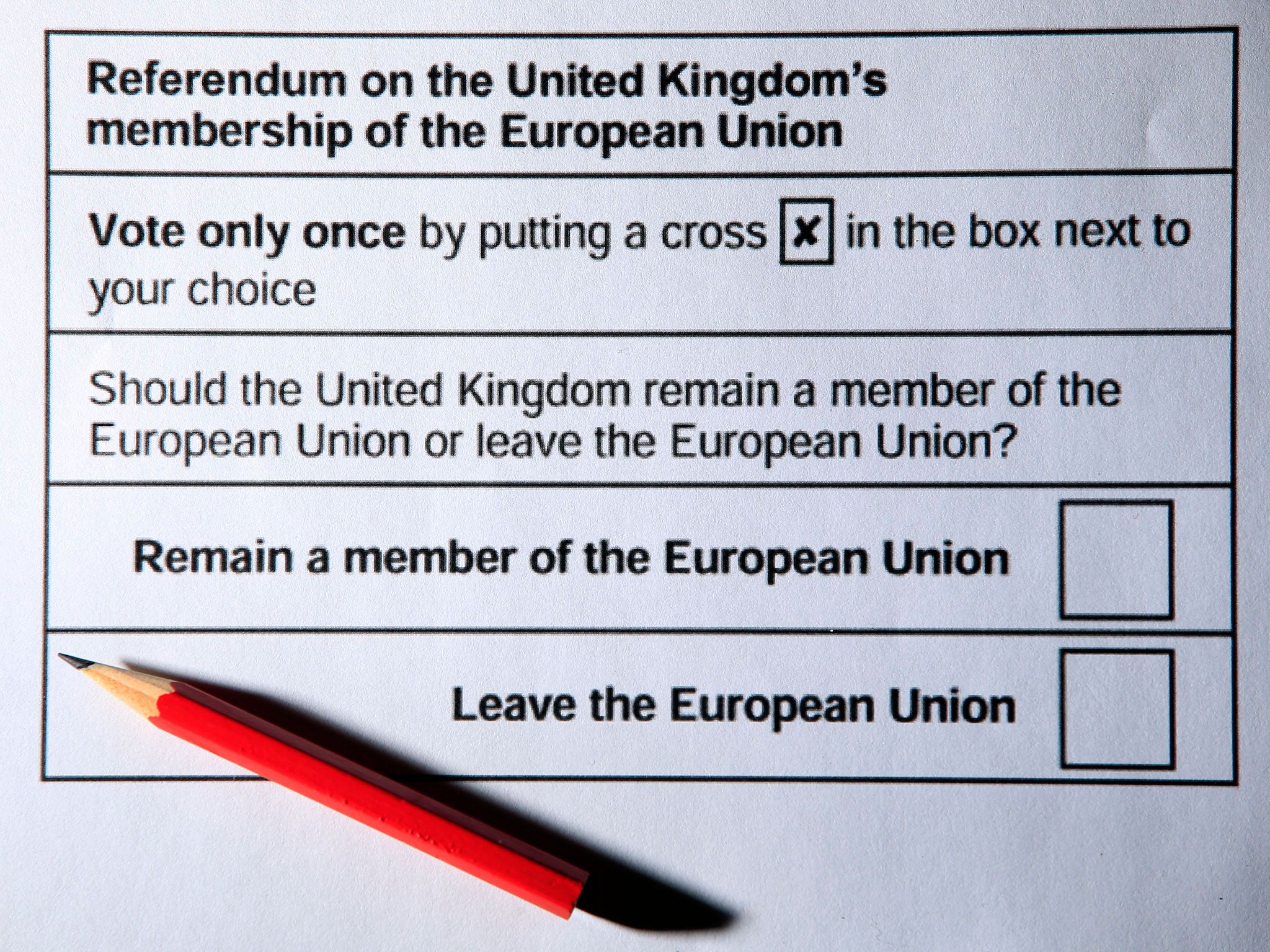Why staying in Europe gives Britain more control over its destiny, not less
Does signing the UN Convention against Torture or joining the UN or NATO really undermine our ability to control our own destiny? If you take the Leave campaign’s argument to its logical conclusion, the most sovereign nation in the world is North Korea


Your support helps us to tell the story
From reproductive rights to climate change to Big Tech, The Independent is on the ground when the story is developing. Whether it's investigating the financials of Elon Musk's pro-Trump PAC or producing our latest documentary, 'The A Word', which shines a light on the American women fighting for reproductive rights, we know how important it is to parse out the facts from the messaging.
At such a critical moment in US history, we need reporters on the ground. Your donation allows us to keep sending journalists to speak to both sides of the story.
The Independent is trusted by Americans across the entire political spectrum. And unlike many other quality news outlets, we choose not to lock Americans out of our reporting and analysis with paywalls. We believe quality journalism should be available to everyone, paid for by those who can afford it.
Your support makes all the difference.“To enter into commercial obligations and treaties is an exercise of sovereignty, not derogation from it.” You could be forgiven for thinking those words were uttered this week by someone like European Commission President Jean Claude Juncker or European Parliament President Martin Schulz. But, in fact, they were said by Margaret Thatcher in 1962. She was right then and it remains as true today.
Yet leading figures in the Leave campaign like Boris Johnson and Michael Gove have made sovereignty a key pillar of their argument. On the face of it, they make a beguiling pitch – by leaving the EU we can take control of our own destiny and that we should only have to answer to laws passed by our own sovereign Parliament. But that simplistic analysis misunderstands sovereignty, control and Parliament.
Britain has always pooled sovereignty. We have long signed treaties and enthusiastically joined international institutions. Dominic Grieve, the former Attorney General, once asked the Foreign Office how many international documents bore the British seal or signature. Officials replied to say 13,200 and stopped counting when they got back as far as 1834. Each of these will erode the kind of “sovereignty” advanced by the likes of Johnson and Gove, but does signing the UN Convention against Torture or joining the UN or NATO really undermine our ability to control our own destiny? If you take the Leave campaign’s argument to its logical conclusion, the most sovereign nation in the world is North Korea.
We pool sovereignty to increase our control. In the 1940s, we joined the UN “in a common struggle against savage and brutal forces seeking to subjugate the world” and a decade later NATO was formed to prevent the Cold War boiling over in Europe. By the 1960s, the future Conservative Prime Minister and doyenne of the Eurosceptic right - Margaret Thatcher - realised that the defence of Western Europe and its economic prosperity required a pooling of sovereignty to enhance British power.
Today, pooled sovereignty is more important than ever. National power, influence and self-determination are directly proportionate to the strength of our international partnerships. Hoarding sovereignty is not the answer to the threats posed by climate change, by an increasingly aggressive President Putin of Russia or by cross-border crime and terrorism.
Being in Europe gives Britain greater control. Over our economy because we agree joint rules - in the form of the EU’s free trade Single Market - to increase trade, lower prices and create jobs. Over our security because we share intelligence and co-operate over border protection. And over global events because we act with our partners and have a voice at the top table when decisions are made.
Leave campaigners constantly talk Britain down and say we cannot influence events in Brussels. The opposite is, however, true. The cliché that we “punch above our weight” is accurate. We do exercise disproportionate influence in Europe and over decades have bent the institutions to our will. British Prime Ministers from Wilson to Thatcher (who was central to the creation of the Single Market) to Blair and now Cameron have all shaped Europe to work better for Britain’s interests. Recently we’ve led the way on imposing sanctions on Russia, on preventing Iran from obtaining nuclear weapons and on getting agreement at the Paris climate change talks.
Nobody forces us to co-operate with our neighbours in Europe and the EU does not control us. Because of our special status, enhanced by the deal the Prime Minister has recently negotiated, we retain complete control of our public spending; interest rates; defence and foreign policy; justice, policing and home affairs policy; as well as public services like healthcare, education and public transport. We are not run by Brussels. We are not in the euro and not part of the Schengen Area. We retain full control of our currency and borders. And our Parliament remains sovereign. The very fact we are having a referendum, passed into law by our Parliament, is a testament to that. If we don’t want to be a part of something anymore – be it the EU, Nato, the UN – Parliament can make that happen. But that doesn’t mean we should.
As the Prime Minister recently said, leaving Europe offers the illusion of sovereignty but without the power. Leave campaigners say we should follow the path pursued by countries like Norway and Switzerland. But they still pay into the EU budget, adhere to EU regulations and accept free movement. They pay and yet have no say. Hardly a shot in the arm for British sovereignty.
Of course co-operation within the EU involves compromise, but this is true of any partnership. Think of those other post-Second World War institutions such as NATO’s Article 5, where an attack on one member leads to a collective response, or decisions made by the UN Security Council. Each of these involves a pooling of sovereignty but enhances Britain’s standing and strength in the world.
We must not cut off our nose to spite our face. Outside of the EU, our economy would be weaker, our security would be compromised and our influence in the world diminished. Being in Europe by itself is not a solution to the challenges our country faces, but being out of it would make all problems harder to solve. We wouldn’t have more control. We would have less.
Jack Straw and Kenneth Clarke MP are both former Home and Justice Secretaries
Join our commenting forum
Join thought-provoking conversations, follow other Independent readers and see their replies
Comments